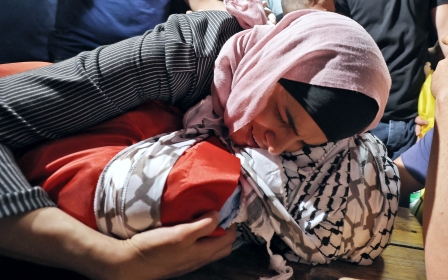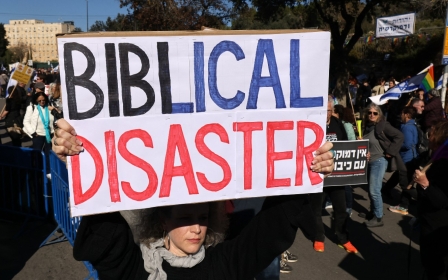Palestinians welcome UN vote asking ICJ to give opinion on Israel's occupation

Palestinian officials on Saturday welcomed a vote by the United Nations General Assembly approving a request for an advisory opinion from the International Court of Justice (ICJ) on Israel's occupation of Palestinian territories.
The 193-member UNGA passed the resolution on Friday with 87 votes in favour, 26 against, and 53 abstentions.
The opinions of the Hague-based ICJ, which settles disputes between countries, are binding but the court has no power to enforce them.
Palestinians said the decision was a "victory" while Israeli politicians slammed it as "contemptible".
"The time has come for Israel to be a state subject to law, and to be held accountable for its ongoing crimes against our people," said Nabil Abu Rudeineh, spokesman for Palestinian President Mahmoud Abbas.
Hussein al-Sheikh, secretary-general of the PLO, said the vote "reflects the victory of Palestinian diplomacy".
Israeli Prime Minister Benjamin Netanyahu, who this week took office as the head of a government that has set settlement expansion as a priority, slammed the decision as "despicable".
"The Jewish people are not occupiers in their own land nor occupiers in our eternal capital Jerusalem and no UN resolution can distort that historical truth," Netanyahu said in a video message.
Netanyahu had made a series of phone calls to world leaders before the vote urging them vote against the resolution. The United States, the United Kingdom and Australia were among the nations that voted against.
US news outlet Axios reported that when Netanyahu asked Ukraine's President Volodymyr Zelensky for support in the vote, he requested military aid in exchange. Netanyahu did not commit to Zelensky's request who then refused to vote against the resolution.
The resolution asks the ICJ to "urgently" weigh in on Israel's "prolonged occupation, settlement and annexation of the Palestinian territory", which it said violated the Palestinians' right to self-determination. The resolution referred to Palestinian lands occupied by Israel since the 1967 war: the West Bank, Gaza and East Jerusalem.
It also referred to policies aimed at "altering the demographic composition, character and status of the holy city of Jerusalem". The resolution asks the court for an opinion on how these Israeli policies and practices "affect the legal status of the occupation, and what are the legal consequences that arise for all states and the United Nations from this status".
In 2004, the ICJ judged that the separation wall Israel had built, mainly inside the occupied West Bank and East Jerusalem, was "contrary to international law".
Before the vote on Friday, Palestinian UN envoy Riyad Mansour noted that the vote came one day after the swearing-in of a new Israeli government that promises to expand illegal settlements and Israeli sovereignty in the West Bank.
"We trust that, regardless of your vote today, if you believe in international law and peace, you will uphold the opinion of the International Court of Justice when delivered and you will stand up to this Israeli government right now," Mansour told the General Assembly.
His Israeli counterpart, Gilad Erdan, preempted the decision by saying it was "completely illegitimate".
"No international body can decide that the Jewish people are 'occupiers' in their own homeland. Any decision from a judicial body which receives its mandate from the morally bankrupt and politicised UN is completely illegitimate," he said in a statement ahead of the vote.
Middle East Eye propose une couverture et une analyse indépendantes et incomparables du Moyen-Orient, de l’Afrique du Nord et d’autres régions du monde. Pour en savoir plus sur la reprise de ce contenu et les frais qui s’appliquent, veuillez remplir ce formulaire [en anglais]. Pour en savoir plus sur MEE, cliquez ici [en anglais].





